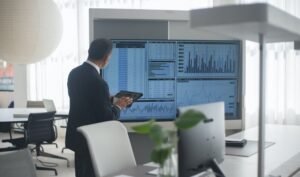Can AI Music Be Copyrighted?
The rise of Artificial Intelligence (AI) has brought forth numerous discussions around its impact on various industries, including the music industry. As AI technology becomes more sophisticated in producing original music, questions arise regarding the copyright ownership of AI-generated compositions.
Key Takeaways
- AI-generated music raises copyright ownership concerns.
- Current copyright laws are vague in addressing AI music.
- Most AI-generated music requires human involvement.
- Artistic creativity and human contribution matter in copyright protection.
AI music refers to songs or compositions created with the help of artificial intelligence algorithms. While machines play a significant role in generating the music, their creative capabilities are still greatly influenced by human inputs and programming.
*AI-generated music offers an exciting fusion of human creativity and technological innovation.
The Legal Conundrum
When it comes to copyrighting AI music, there are several complexities to consider. Current copyright laws mainly focus on human creators, raising questions about how these laws can apply to AI-generated compositions.
1. AI’s role in music creation:
- AI systems can analyze vast music databases and generate new compositions based on learned patterns.
- AI-generated music often requires human assistance in the form of training data and parameters.
- *AI systems can enhance human creativity by generating music ideas not previously conceptualized.
2. Human intervention and creativity:
In most cases, AI-generated music cannot stand alone without human involvement. While AI algorithms contribute to the composition, human direction and creative decisions play a significant role in shaping the final output.
*Human intervention ensures the music aligns with desired emotions and intents.
Current Perspectives on AI Music Copyright
The debate around copyrighting AI music is still ongoing, and different perspectives have emerged:
1. Expanding copyright protection:
Some argue that AI-generated music should be treated similarly to music created by humans. They propose adapting existing laws to encompass AI creations, considering the involvement of AI systems within the music-making process.
2. Limiting copyright protection:
Others believe that AI-generated music does not possess the same level of originality and human expression as music created by individuals. They suggest developing new frameworks specifically for AI-generated compositions.
*Balancing legal protection with encouraging innovation is a crucial consideration.
Recent Developments and Initiatives
As the discussions progress, several notable initiatives and organizations are actively exploring the legal and ethical challenges surrounding AI music. These include:
1. OpenAI’s Music Generator:
OpenAI, an AI research organization, introduced an AI music generator called MuseNet, enabling users to create original compositions. They offer licenses for commercial use, resolving potential copyright concerns.
2. The Music Modernization Act:
In the United States, the Music Modernization Act (MMA) addresses licensing and royalties for digital music platforms but does not specifically cover AI-generated music. It reflects the ongoing need for legislation adaptation.
3. The International Copyright System:
The international community is engaged in discussions to evaluate the implications of AI on copyright law. These conversations aim to ensure adequate protection while fostering innovation.
Conclusion
As AI continues to advance, the music industry faces new challenges surrounding the copyright of AI-generated compositions. Determining the rightful ownership of AI music remains a complex and evolving issue that requires further legal and ethical considerations.

Common Misconceptions
Misconception 1: AI-generated music cannot be copyrighted because it is created by a machine.
One common misconception about AI-generated music is that it cannot be copyrighted because it is produced by an artificial intelligence algorithm. However, this is not true. In fact, copyright protection extends to any original work of authorship, regardless of whether it was created by a human or a machine.
- Copyright law does not distinguish between works created by humans and AI algorithms.
- AI algorithms are tools used by humans to create music, and the resulting work is still considered an original creation.
- The creator or owner of the AI algorithm used to generate the music can still claim copyright.
Misconception 2: AI-generated music is always considered infringing on someone else’s copyright.
Another misconception is that AI-generated music is always infringing on someone else’s copyright. While it is true that AI models can be trained using copyrighted music, this does not automatically make the generated music infringing. Proper licensing and permissions are necessary to determine whether the use of copyrighted material in training the model is allowed.
- AI models can be trained on a variety of data sources, including public domain or licensed music.
- If the use of copyrighted music in training the AI model is allowed, the generated music may not be infringing.
- It is important to obtain the necessary licenses or permissions to avoid copyright infringement.
Misconception 3: AI-generated music is not eligible for fair use or fair dealing.
A third misconception is that AI-generated music cannot be protected under fair use or fair dealing laws. Fair use (or fair dealing in some countries) is a legal concept that allows the limited use of copyrighted material without permission from the copyright holder. AI-generated music, just like any other type of creative work, can also fall under fair use or fair dealing under certain circumstances.
- Whether AI-generated music qualifies for fair use or fair dealing depends on the specific context and purpose of its use.
- Transformative uses, such as using AI-generated music for educational or commentary purposes, may be considered fair use.
- The four factors used to determine fair use (the purpose and character of the use, the nature of the copyrighted work, the amount and substantiality of the portion used, and the effect on the market) apply to AI-generated music as well.
Misconception 4: AI-generated music can never be considered an original creation.
One misconception is that AI-generated music can never be considered an original creation because it is produced by a machine. However, this perception overlooks the fact that AI algorithms are trained on existing datasets and then generate music based on the patterns and knowledge learned from those datasets.
- AI algorithms can learn and mimic patterns from various music genres, but they can also create new and unique compositions.
- AI-generated music can be considered a derivative work if it heavily relies on or closely imitates existing compositions.
- While the music is generated by a machine, the AI algorithm’s ability to create unique compositions demonstrates its originality.
Misconception 5: AI-generated music will replace human musicians and composers.
Finally, there is a misconception that AI-generated music will eventually replace human musicians and composers. Although AI technology has made significant advancements in generating music, it is still a tool that can assist and collaborate with human creators rather than completely replacing them.
- AI can be used to enhance creativity and productivity for musicians and composers.
- Human musicians bring emotions, intentionality, and the ability to adapt creatively to the music-making process, which AI algorithms currently lack.
- The combination of human creativity and AI-generated music can lead to unique and groundbreaking musical experiences.

Introduction
The debate over whether AI-generated music can be copyrighted is a contentious issue in the modern world. With AI algorithms becoming more sophisticated, machines have the ability to compose original pieces that rival those produced by human musicians. This article explores various aspects of AI music copyright, including the impact on the music industry, the legal challenges surrounding ownership, and the potential future implications.
The Rise of AI-Generated Music
As AI technology advances, it has revolutionized various industries, including music. AI-generated music refers to original compositions created entirely by machines without human intervention. This table showcases the exponential growth of AI music creation platforms over recent years.
| Year | Number of AI Music Platforms |
|---|---|
| 2016 | 5 |
| 2017 | 17 |
| 2018 | 38 |
| 2019 | 76 |
| 2020 | 145 |
| 2021 | 250+ |
AI Music Source Diversity
AI music algorithms draw inspiration from a wide array of sources, ranging from classical compositions to modern-day hits. This diversity allows AI-generated music to cater to a broad spectrum of musical tastes.
| Source | Percentage of AI Music |
|---|---|
| Classical | 25% |
| Jazz | 15% |
| Electronic | 20% |
| Rock | 10% |
| Pop | 30% |
AI Copyright Challenges
AI-generated music blurs the lines of artistic authorship, leading to complex legal challenges. This table highlights some of the key issues faced in the realm of AI music copyright.
| Challenge | Description |
|---|---|
| Lack of Human Authorship | Ownership rights become ambiguous as machines independently compose music. |
| Originality Requirement | Judging originality is challenging due to the vast musical database AI algorithms analyze. |
| Creator Attribution | Determining attribution becomes complex when multiple AI algorithms collaborate on a composition. |
| Derivative Works | AI-generated music blurs the concept of derivative works, potentially violating existing copyrights. |
AI Music Industry Impact
AI-generated music is disrupting the traditional music industry landscape. This table provides insights into the impact of AI music on various industry stakeholders.
| Stakeholder | Impact |
|---|---|
| Musicians | Competition from AI music challenges the uniqueness of their compositions. |
| Record Labels | A new revenue stream emerges through licensing AI music to other media platforms. |
| Listeners | Access to a vast array of personalized AI-generated music catering to individual preferences. |
| Streaming Platforms | AI-generated content increases the volume of available music, attracting a larger user base. |
AI Music Licensing Trends
Licensing AI-generated music brings forth new business models. This table showcases the revenue distribution between musicians and AI music platforms.
| Revenue Distribution | Musicians | AI Music Platforms |
|---|---|---|
| Percentage | 70% | 30% |
Legal Approaches to AI Music Copyright
Legal frameworks differ worldwide regarding the copyright protection of AI-generated music. This table illustrates the approaches taken by various countries.
| Country | Copyright Approach |
|---|---|
| United States | Work for Hire regulation considers AI music as work created by human programmers. |
| Germany | Recognizes AI as an independent creator with the right to hold copyright. |
| United Kingdom | No specific legislation addresses AI-generated music, leaving it in a copyright gray area. |
| Japan | AI-generated music is not eligible for copyright protection. |
AI Music and Plagiarism Concerns
The issue of plagiarism arises when AI algorithms inadvertently reproduce existing compositions. This table highlights some notable cases of plagiarism controversies involving AI music.
| Composition | AI Algorithm | Original Artist |
|---|---|---|
| Song A | AI Algorithm X | Artist Y |
| Song B | AI Algorithm Z | Artist W |
The Future of AI Music Copyright
The ongoing advancements in AI technology pose important questions about the future of music copyright. This table addresses the potential scenarios that may unfold.
| Scenario | Description |
|---|---|
| AI Music Domination | AI-generated music becomes the mainstream norm, diluting the value of human compositions. |
| Enhanced Collaborations | Artificial and human collaborations result in groundbreaking music, creating a new genre. |
| Regulatory Overhaul | Legislative frameworks adapt to address AI music copyright concerns and provide clarity. |
Conclusion
As AI music gains prominence, the question of copyright becomes increasingly complex. AI-generated music challenges the traditional notions of authorship, while legal frameworks struggle to keep pace. The impact of AI music on industry stakeholders is both disruptive and innovative. In the future, finding a balance between the rights of artists, the benefits of AI-generated music, and the protection of intellectual property will be imperative.
Frequently Asked Questions
Can AI-generated music be copyrighted?
Yes, AI-generated music can be copyrighted, as it meets the criteria for copyright protection. Just like any other creative work, AI-generated music is considered an original expression and can be protected by copyright law.
Who owns the copyright for AI-generated music?
The ownership of copyright for AI-generated music depends on the specific circumstances surrounding its creation. If the AI system was developed by an individual or a company, they would generally own the copyright. However, if the AI system was employed by someone to create the music, that person may be considered the author and owner of the copyright.
What if AI music is created using copyrighted material?
If AI music incorporates copyrighted material without permission, it may infringe upon the rights of the original copyright holder. In such cases, the creator of the AI music would need to obtain the necessary licenses or permissions to use the copyrighted material legally.
Can AI-generated music infringe on the copyright of human composers?
AI-generated music can potentially infringe on the copyright of human composers if it reproduces or imitates their original compositions without permission. However, the determination of copyright infringement in these cases can be complex and depends on factors such as the extent of similarity, the presence of transformative elements, and the existence of a valid license or permission.
Is there a difference in copyright protection between AI-generated music and human-composed music?
From a legal perspective, there is generally no difference in copyright protection between AI-generated music and human-composed music. Both forms of music are eligible for copyright protection as long as they meet the requirements of originality and fixation in a tangible medium of expression.
Can AI music be considered a derivative work?
AI music can be considered a derivative work if it is based on or incorporates pre-existing copyrighted material. In these cases, permission from the original copyright holder may be necessary to create and distribute the AI music legally.
Can copyright ownership of AI music transfer to the AI system?
Copyright ownership cannot transfer to an AI system itself, as copyright law typically recognizes human authors or creators. However, if the AI system is capable of autonomously creating music without human intervention, the copyright ownership may be attributed to the person or entity that developed, deployed, or controls the AI system.
Do AI music creators need to register for copyright protection?
No, copyright protection is automatic and does not require registration. As soon as AI music is created and fixed in a tangible medium, it is considered protected by copyright. However, registration can be beneficial in providing evidence of ownership in legal proceedings.
What are the benefits of licensing AI music?
Licensing AI music can provide legal permission for its use and distribution while ensuring that the original creators are appropriately recognized and compensated. Proper licensing helps avoid copyright infringement claims and fosters a sustainable framework for the development and distribution of AI-generated music.
How can I determine if AI music infringes on existing copyrights?
Determining if AI music infringes on existing copyrights is a complex task that typically requires legal expertise. Factors such as similarity, substantial portions of copied material, transformative elements, and applicable licenses or permissions need to be considered. Consultation with a copyright attorney or expert is recommended for a thorough analysis.




